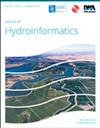基于ANN-PSO和MARS的收敛与发散河漫滩复合河道流量估计
IF 2.2
3区 工程技术
Q3 COMPUTER SCIENCE, INTERDISCIPLINARY APPLICATIONS
引用次数: 0
摘要
摘要河流流量估算是实施洪水管理技术和基本防洪排水系统的关键。在正常的汛期,水只在主河道中流动。在洪水期间,河流由主河道和洪泛平原组成,统称为复合河道。在洪泛平原沿纵向汇聚或分散的非棱形复合河道中,计算流量是一项挑战。为了解决这些复杂的问题,各种软计算技术在水利工程领域得到了广泛的应用。本文采用混合软计算技术-人工神经网络和粒子群优化(ANN-PSO)和多元自适应回归样条(MARS)对非棱柱形复合明渠的放电进行建模。分析考虑了9个无量纲参数——河床坡度、相对流动深度、相对纵向距离、水力半径比、收敛或发散角、流动长径比、相对摩擦系数和面积比——作为影响因素。通过伽玛检验来确定输入变量的最佳组合。所建立的MARS模型取得了满意的结果,平均绝对百分比误差(MAPE)小于7%,R2大于0.90。本文章由计算机程序翻译,如有差异,请以英文原文为准。
Discharge estimation in a compound channel with converging and diverging floodplains using ANN–PSO and MARS
Abstract The discharge estimation in rivers is crucial in implementing flood management techniques and essential flood defence and drainage systems. During the normal flood season, water flows solely in the main channel. During a flood, rivers comprise a main channel and floodplains, collectively called a compound channel. Computing the discharge is challenging in non-prismatic compound channels where the floodplains converge or diverge in a longitudinal direction. Various soft computing techniques have nowadays become popular in the field of water resource engineering to solve these complex problems. This paper uses a hybrid soft computing technique – artificial neural network and particle swarm optimization (ANN–PSO) and multivariate adaptive regression splines (MARS) to model the discharge in non-prismatic compound open channels. The analysis considers nine non-dimensional parameters – bed slope, relative flow depth, relative longitudinal distance, hydraulic radius ratio, angle of convergence or divergence, flow aspect ratio, relative friction factor, and area ratio – as influencing factors. A gamma test is carried out to determine the optimal combination of input variables. The developed MARS model has produced satisfactory results, with a mean absolute percentage error (MAPE) of less than 7% and an R2 value of more than 0.90.
求助全文
通过发布文献求助,成功后即可免费获取论文全文。
去求助
来源期刊

Journal of Hydroinformatics
工程技术-工程:土木
CiteScore
4.80
自引率
3.70%
发文量
59
审稿时长
3 months
期刊介绍:
Journal of Hydroinformatics is a peer-reviewed journal devoted to the application of information technology in the widest sense to problems of the aquatic environment. It promotes Hydroinformatics as a cross-disciplinary field of study, combining technological, human-sociological and more general environmental interests, including an ethical perspective.
 求助内容:
求助内容: 应助结果提醒方式:
应助结果提醒方式:


